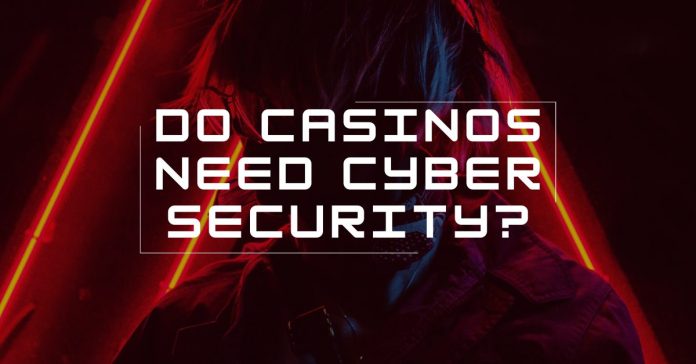In this post, I will answer the question – Do Casinos Need Cyber Security?
The global gaming industry thrives on the excitement of chance and the allure of winning big. Casinos, the beating heart of the industry, handle a significant volume of sensitive data and financial transactions on a daily basis.
This very nature makes them prime targets for cybercriminals, posing a significant threat to their assets, operations, and, most importantly, their customers’ trust.
The casino industry is a thriving business, generating billions of dollars in revenue annually. However, as the industry grows increasingly reliant on technology, it also becomes a prime target for cybercriminals.
This raises a crucial question: do casinos need cyber security?
The answer is an unequivocal yes. Casinos are incredibly vulnerable to a wide range of cyber threats.
Table of Contents
A Landscape Rife with Threats
The potential for cyberattacks in the casino industry is vast and ever-evolving. Let’s delve into some of the major threats casinos face:
1. Data Breaches: Hackers constantly seek to gain access to sensitive customer information like names, addresses, credit card details, and even social security numbers. This data can be used for identity theft, financial fraud, and even blackmail, causing immense harm to individuals and damaging the casino’s reputation.
2. Ransomware Attacks: These malicious software programs encrypt critical casino systems, effectively holding them hostage. Operations come to a standstill, resulting in financial losses, reputational damage, and a complete loss of customer trust.
3. Manipulation of Games: Malicious actors can exploit vulnerabilities in electronic gaming machines (EGMs), manipulating outcomes and stealing money from unsuspecting players. This not only undermines the integrity of fair play but also erodes players’ confidence in the casino’s legitimacy.
4. Denial-of-Service (DoS) Attacks: These attacks overwhelm casino websites with traffic, making them inaccessible to legitimate users. This disrupts online gambling operations, hindering potential revenue generation and tarnishing the brand image.
BEST WEB HOSTING SERVICES
The Underlying Vulnerabilities
What makes casinos particularly vulnerable to such cyberattacks? Several factors contribute:
1. High-Value Targets: The sheer volume of financial transactions and sensitive data handled by casinos makes them highly attractive to cybercriminals seeking significant gains.
2. Legacy Systems: Many casinos rely on outdated IT infrastructure, often lacking the necessary security features and vulnerability patches to withstand modern cyberattacks.
3. Limited Security Awareness: Not all casino staff may be fully aware of the latest cyber threats and how to protect themselves and the organization from them. Lack of proper training and awareness programs can leave critical gaps in the security posture.
4. Budget Constraints: Casinos might prioritize other areas of investment over robust cybersecurity measures due to budgetary limitations. This short-sighted approach can expose them to significant long-term risks.
Building a Secure Future For Casino Websites
It’s imperative for casinos to proactively address these vulnerabilities and implement robust cybersecurity measures to protect their assets, operations, and customer trust.
Here are some key steps they can take:
1. Comprehensive Cybersecurity Program: Casinos need a well-defined cybersecurity program encompassing risk assessments, vulnerability assessments, penetration testing, incident response planning, and employee training programs.
2. Investing in Security Technology: Firewalls, intrusion detection/prevention systems (IDS/IPS), data encryption, and security awareness training are crucial investments for casinos to strengthen their defences against cyber threats.
3. Staying Informed: Continuous monitoring of the evolving cyber threat landscape and adapting security measures accordingly are essential for casinos to stay ahead of the curve and mitigate emerging threats.
4. Partnering with Experts: Collaborating with reputable cybersecurity firms can offer valuable expertise and resources to identify and address vulnerabilities, build a robust security posture, and implement effective incident response strategies.
BEST WEB SECURITY SERVICES
Tailored Security for Specific Areas
Beyond these general measures, casinos can implement specific security protocols for different areas of their operations:
1. Customer Data: Data encryption and secure storage are essential for protecting sensitive customer information. Strong authentication and authorization procedures further enhance security.
2. Financial Transactions: Implementing secure payment processing systems and adhering to industry regulations are crucial to safeguard financial transactions.
3. EGMs: Utilizing secure gaming machines and establishing procedures for detecting and preventing cheating helps ensure fair play and protect player interests.
4. Website and Online Platforms: Robust firewalls and IDS/IPS are vital to protect casino websites and online gambling platforms from cyberattacks.
5. Physical Security: Implementing physical security measures like access control protocols and video surveillance systems safeguards the casino’s IT infrastructure from unauthorized physical access.
Do Casinos Need Cyber Security?: Frequently Asked Questions
What are the cyber threats to casinos?
Casinos face a wide range of cyber threats, including:
- Data breaches: Hackers can steal sensitive customer information, including names, addresses, credit card details, and Social Security numbers. This data can be used for identity theft, fraud, and blackmail.
- Ransomware attacks: Hackers can encrypt casino systems, making them inaccessible until a ransom is paid. This can disrupt operations, damage the casino’s reputation, and result in substantial financial losses.
- Manipulation of games: Hackers can manipulate electronic gaming machines (EGMs) to cheat players and steal money.
- Denial-of-service (DoS) attacks: Hackers can flood casino websites with traffic, making them unavailable to legitimate users. This can disrupt online gambling operations and damage the brand’s reputation.
- Insider threats: Employees or contractors with access to sensitive data or systems may misuse their access for personal gain.
READ ALSO: Bitcoin Casinos Compared to Traditional Casinos: 5 Key Advantages
What kind of security do casinos use?
Casinos use a variety of security measures to protect themselves from cyberattacks, including:
- Firewalls: These devices filter traffic between the casino’s network and the outside world, blocking unauthorized access.
- Intrusion detection/prevention systems (IDS/IPS): These systems monitor the casino’s network for suspicious activity and can take action to block attacks.
- Data encryption: This process scrambles sensitive data so that it can only be read by authorized users.
- Security awareness training: This training helps casino employees to identify and avoid cyber threats.
- Vulnerability assessments and penetration testing: These activities help casinos to identify and fix security weaknesses in their systems before attackers can exploit them.
- Incident response plan: This plan outlines the steps that casinos will take in the event of a cyberattack.
How can casinos protect themselves from cyberattacks?
In addition to the security measures listed above, casinos can take a number of steps to protect themselves from cyberattacks, including:
- Implementing a comprehensive cybersecurity program
- Investing in security technology
- Staying informed about cyber threats
- Partnering with a cybersecurity expert
- Implementing specific security measures for different areas of their operations
- Creating a culture of security within the organization
Why is cybersecurity important for casinos?
Cybersecurity is important for casinos for several reasons, including:
- Protecting customer data: Casinos are responsible for protecting the privacy and security of their customers’ data.
- Protecting financial transactions: Casinos handle a large volume of financial transactions and need to protect these transactions from fraud and theft.
- Maintaining a competitive edge: In today’s competitive gaming industry, casinos must demonstrate that they are taking proactive steps to protect their customers and their business.
- Protecting their reputation: A cyberattack can damage a casino’s reputation, leading to a loss of customers and revenue.
READ ALSO: Crypto Security Insights: Navigating Curacao Casinos
What are the future trends in casino cybersecurity?
The casino industry is constantly evolving, and so are the cyber threats that it faces. Some of the future trends in casino cybersecurity include:
- The increasing use of artificial intelligence and machine learning to detect and prevent cyberattacks.
- The adoption of blockchain technology to secure customer data and financial transactions.
- The development of new regulations and standards for cyber security in the gaming industry.
By staying informed about the latest trends and threats and by taking proactive steps to protect themselves, casinos can ensure that they are prepared for the future of cybersecurity.
Investing in Cybersecurity: A Strategic Imperative
Cybersecurity is not an optional expense for casinos; it’s a strategic imperative. In today’s digital world, where cyber threats are constantly evolving, casinos must prioritize robust security measures to ensure the safety and security of their customers’ data, financial transactions, and overall operations.
By embracing a proactive approach to cybersecurity, casinos can create a secure environment, build trust with their customers, and maintain a competitive edge in the thriving gaming industry.
Remember, cybersecurity is an ongoing journey, not a destination. Casinos must constantly evaluate their security posture, adapt to evolving threats, and invest in the latest technologies and best practices to maintain a resilient and secure environment for all stakeholders.
INTERESTING POSTS
- Why Cybersecurity Is Imperative For The BFSI Industry?
- How Online Gambling Sites Use Technology To Ensure Player Security
- 4 Benefits Of Mobile Casinos
- The Cybersecurity Technologies Used In Online Casinos
- The Future Of Live Casino Gambling And The Potential For New
- Protect and Play: The Importance of Online Casino Security for Player Trust
- Top 5 Ways Online Casinos Secure Their Customer Information
- Is Cybersecurity Essential For Online Casino Websites?
About the Author:
Mikkelsen Holm is an M.Sc. Cybersecurity graduate with over six years of experience in writing cybersecurity news, reviews, and tutorials. He is passionate about helping individuals and organizations protect their digital assets, and is a regular contributor to various cybersecurity publications. He is an advocate for the adoption of best practices in the field of cybersecurity and has a deep understanding of the industry.























